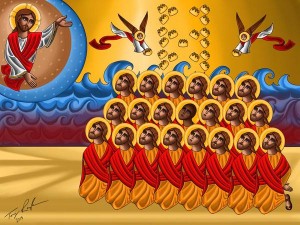Playing the Long-Game on God’s Team
 Several things have been on my mind this week. We have just celebrated All Hallows Eve, All Saints, and All Souls. The weather is changing. In the Northern Hemisphere we are settling into our school and colder weather routines. It’s getting darker. We’re beginning to get rain on the Central Coast of California. Other areas are seeing snow already.
Several things have been on my mind this week. We have just celebrated All Hallows Eve, All Saints, and All Souls. The weather is changing. In the Northern Hemisphere we are settling into our school and colder weather routines. It’s getting darker. We’re beginning to get rain on the Central Coast of California. Other areas are seeing snow already.
While much of the hemisphere settles in for a long winter sleep of the vegetation, here the grass is sprouting after a long, dry summer and early fall. By Christmas, all will be green and beautiful. Wildflowers will be in bloom and it will feel to someone from farther north to be spring already. I must admit, it took me a while to get used to this.
But despite the appearance of spring outside, it is dark earlier and colder. Rain gear is needed and with the humidity, warm coats are a must.
We play the long-game in our lives in the natural world. Nothing happens overnight. Things just begin, grow, and reach their term over an extended period. Sometimes what develops is objectively good. Sometimes not so much.
On the grand stage of international relations and the history of peoples, the long-game of God becomes even more important. We are all called to play our part in it.
In the second century before Jesus was born, Greek warriors, led by Alexander the Great, conquered much of the known world. Palestine was one of the conquered lands. The Greeks were not a people who encouraged the peoples of conquered lands to continue their own religious beliefs and traditions. Conquered people were expected to worship the Greek gods instead of their own. This applied to the people of Israel as well. Some of the Jewish leaders encouraged the people to go along with their new rulers. But not all agreed to that and resistance arose, led initially by Mattathias, son of John, and later by his own son, Judas Maccabeus. It was a time of great turmoil and struggle. Eventually, the Greeks were conquered by the Romans, who allowed Jews to worship as they pleased, as long as they did not contest Roman rule. But that’s a story for another time.
As we near the end of our liturgical year, we listen to the witness of a group of Jewish martyrs during the years of Greek rule of their land. Their story is told in the second book of Maccabees. (2 Mac 7:1-2, 9-14) Seven brothers and their mother had been ordered to eat pork, in direct opposition to Jewish law. All refused. One by one, they were tortured and killed, with their mother being the last to die. Each brother got a turn to speak and each testified of his willingness to die rather than to break God’s law. They spoke of their trust in “the King of the world (who) will raise us up to live again forever.” The Sunday reading only includes the stories of the first, third, and fourth brother, but the story of all is found in the complete text.
The brothers and their mother recognized their place in God’s long-game. They knew that whatever happened to them, God was still in charge and would not abandon them. They might not/would not survive this time of witness/martyrdom, but God would raise them back to life – a life that would not end.
St. Paul recognized by the last months and years of his life that the return of the Lord was going to be part of God’s long-game too. Originally, Christians thought and taught that Jesus would return during their lifetimes. The end of the world was coming soon. But as time went on, it became clear that it was going to take longer.
Paul writes to the people of Thessalonica (2 Thess 2:16-3:5) to encourage them to keep up their hopes and good work, encouraged by the grace and love of the Lord Jesus Christ. He asks God to bless them and strengthen them to live in faith through good deeds and words. They are to carry on Christ’s work in their families and communities. He also asks them to pray for him, for protection from those who have lost faith or never believed. Finally, he prays that the Lord will continue to guard them and guide them in their lives of faith, helping them to carry on their lives of faith with the strength of Christ.
Jesus too speaks today of the reality of life after death. (Lk 20:27-38) A group of students of the Law, the Sadducees, did not believe in life after death. The concept was one that had developed slowly in Jewish thinking and was not accepted by all. Trying to trap Jesus into falling into either the camp that believed or the camp that didn’t, and thereby enter into the religious politics of the day on one side or the other, they presented a case study.
A man was married, but his wife had no children before he died. According to the Law, the man’s brother was to marry his brother’s widow. (It was allowed to have more than one wife at that time.) He too died without her bearing a son. The son would have been considered the child and heir of the first brother. This continued through a total of seven sons and marriages. The woman never had a child. Eventually, all had died. They asked Jesus, “Now at the resurrection, whose wife will that woman be?”
Jesus answered, but from a totally different perspective than consideration of inheritance of family position or heritage. Those who die no longer are bound by traditions such as marriage. They are free like angels. They are children of God and cannot die again.
Jesus knows that God’s approach is to act over time, touching the hearts and minds of people, so that gradually humans come to live as members of the Kingdom of Heaven in their daily lives. It’s a long-game strategy, but it is consistent with the reality that God created us to be free to make up our own minds about what to do and how to act. God doesn’t force anyone to act justly or lovingly. No one is forced to forgive or to accept suffering or criticism rather than act evilly or curse the opponent. Each person must decide personally how to react in good and hard times.
It’s a bit like the struggle sometimes waged in households over what kind of language is acceptable for children and adults to use. If everyone is using foul language at school or at work, is it OK to use it oneself? What alternatives are there? How can one be part of the group and not behave exactly like everyone else? Does it really make any difference in the long run?
Pope Francis, speaking to the Catholic community of Bahrain recently, encouraged them and all of us to do what is good “even when evil is done to us.” He continued, “There will be cases of friction, moments of tension, conflicts and opposing viewpoints, but those who follow the Prince of Peace must always strive for peace. And peace cannot be restored if a harsh word is answered with an even harsher one. No, we need to ‘disarm,’ to shatter the chains of evil, to break the spiral of violence, and to put an end to resentment, complaints, and self-pity.”
This is long-game language and strategy. We are all called to play the long-game on God’s team.
I pray that you and I will have the courage and strength to make decisions that lead to reconciliation and peace in our families, our communities, and our world in the days and weeks to come. We are going into the holidays soon. A new year will begin for our Church community in just a couple of weeks. 2023 will be upon us before we know it. Now is the time to commit ourselves to the long-game of God’s kingdom, to build a world of peace, forgiveness, and mutual care and support.
Go team!
Readings for the Thirty-second Sunday in Ordinary Time – Cycle C
Read More














